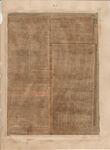< Hindu Psychology (continued from page 4-142) >
reliable witnesses. I will relate one of this character. While in Madras I was several days the guest of Mr. D. S. White, residing in Kilpauk. This gentleman, connected with the Board of Education, and Assistant-Registrar of Assurances, is a free-thinker on all matters religious and political. Accompanied by him, two Eurasian gentlemen connected with the publication of the Anglo-Indian, and a few others, I repaired to a native’s house, to see the phenomena of casting out a demon among the lower class Hindus. The subject was a woman, and not, I confess, a very prepossessing one. Her eye was dull; the surface of the hand cool, moist, clammy, and the whole appearance stupid in the extreme. Inquiring of the mother, through my interpreter, I learned that this young woman had, in the first place, spells of being very silent, of looking into vacancy, and refusing to notice her friends. These peculiarities were followed by tremblings, whirling motions of the head, and other obsessional conduct, till she refused to bathe, to comb her hair, or speak. It was pronounced, “possession by a dumb devil.”
They sent for a “devil-priest,” as they familiarly term them, one gifted with the power of exorcism. He could not attend, and, after some waiting, a “priestess” came, and then another. A circle was drawn in the sand in front of the hut, one of these mediumistic women stepping inside of the circular area became spasmodic, the head began to whirl; she was soon entranced, and called for camphor. A rude lamp of cocoa-nut oil was burning just outside the circle, and the incense-smoke of the camphor came from the interior of the circle. At this point another woman was entranced by a spirit speaking a different dialect. And now while the incense-smoke was dying away, they brought and placed the obsessed Tamil woman within the area of the circle. Then followed rude music, with threatenings and coaxings of the demoniacal spirit to leave. It was a failure. And now, unexpectedly to Mr. White, his servant woman who had been in his employ for twelve years, was suddenly entranced, constituting herself master of the ceremonies. This servant woman, Mrs. Anthraci, declared that the other women failed because controlled by evil spirits. She then commanded the dress of the obsessed woman to be changed, a new mat to be placed for her to sit upon, the green branch from a tree to be brought, and some frankincense to be burned. It was all done. Then she beat the obsessed woman’s body with a rod, “pathetised” her head, invoked the gods, &c., &c., and “the dumb devil left.” This was one of the many phenomena I witnfessed among the lower and poorer classes, Those that I saw in Hindu high life, and especially among the Dravida Brahmans, I do not propose to peddle about too cheaply. I psychologised quite a number in India. The Hindus being mild, negative, and sensitive, are easy subjects.
Owing to introductions to native princes, and distinguished Brahmans and Mahomedans, when dining with His Grace the Duke of Buckingham, Governor of Madras, and also at the levee held by Lord Lytton, the Viceroy of India, I was put into fraternal relations with some of the most distinguished native Brahmans of India. And to some of these I am under deep and lasting obligations. To say that these gentlemen “imposed upon me,” is to insult them.
When Mr. W. L. D. O’Grady, editor of the American Builder, and late of the Bank of Madras, writes hereafter upon “Hindu Psychology,” will he have the kindness not to measure my knowledge of this subject by his yard-stick of arrogance?
The last Banner of Light, just put into my hands, makes me say I had a glorious time with Buddhist priests in India. It should have read Brahman priests. Probably my careless penmanship caused the blunder. It was in Ceylon, China, and other Eastern countries that I saw so many Buddhist priests.
J. M. Peebles, M. D.
London, January 8th, 1878.
Present or Departed?
...
<Untitled> (The Lengthy paper, by “M.A.” (Oxon.))
Sir, – The Lengthy paper, by “M.A.” (Oxon.), ...
...
<... continues on page 4-144 >
Editor's notes
